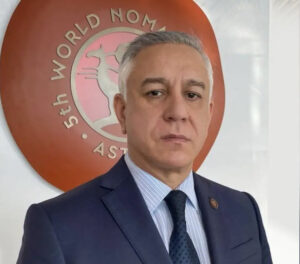ASTANA — With five months remaining until the start of the World Nomad Games in Kazakhstan, Nail Nurov, the head of the directorate for the preparation and organization of the World Nomad Games, discussed the scale of preparations, in a recent interview with Kazinform.

A traditional Turkic game featuring traditional horseback competition. Photo credit: worldnomadgames.kz
“For the first time, we are hosting the World Nomad Games, which have their unique standards and regulations. The last Games were at a very high level, so we are creating all the conditions to make the fifth Games the most spectacular,” said Nurov in an interview published on April 6.

Nail Nurov. Photo credit: worldnomadgames.kz
The ongoing preparations for the World Nomad Games include facets ranging from the reconstruction of urban infrastructure to the planning of logistics, accommodation and catering. The Kazakh Ministry of Tourism and Sports is the supervising ministry. The scientific program is implemented in cooperation with the Ministry of Science and Higher Education and the Ministry of Internal Affairs is responsible for security aspects.
Astana: the venue of World Nomad Games
Astana, Konaev, Turkistan, and Aktau were among the cities under selection as the venue. However, the decisive factor favoring Astana was the availability of convenient sports and urban infrastructure, enabling the hosting of 4,000 participants and tourists from over 100 countries. The sports complexes also had to comply with international standards.
“Astana’s infrastructure facilitated the application of a convenient ‘linear principle’ in selecting venues for the games, where those venues are positioned along the same line. In our case, the principle of a straight line from the Kazanat hippodrome to the old railway station, from south to north, is applied,” said Nurov.
The World Nomad Games present an opportunity for Kazakhstan to showcase its readiness to popularize national sports globally, boasting infrastructure capable of hosting international ethnic sports events. Nurov added that this is a prerequisite for elevating national sport to a new level.
A new format of World Nomad Games
According to Nurov, they revised the approach to organizing the games. Previous editions in the Kyrgyz Republic and Türkiye were celebrated as festivals with a fun-loving nature. However, this year, the directorate aims to elevate the games into a major sporting event by raising standards, expanding the scale and enhancing the competition. Notably, each country will now be represented by a single national team, with team scores contributing to country rankings, as opposed to the previous focus solely on individual scores.
The World Nomad Games program is set to feature 20 competitive and 10 demonstration sports. The competitions include horse racing, traditional forms of wrestling, intellectual games, martial arts, archery, national bird hunting, folk games, as well as ethnic sports. Some 113 sets of medals will be awarded in the competition program.
Additionally, national federations of other countries have submitted applications for the demonstration sports presentation. Nurov stated that they have received a significant number of applications, from which the most spectacular ones will be selected.
Upgrading the existing venues
As part of the preparation, Nurov mentioned that the reconstruction of the Kazanat Hippodrome, Astana Arena stadium and the Alau Ice Palace are prioritized.
After the reconstruction, the Kazanat Hippodrome will be able to accommodate 10,000 spectators. The ethno-village anticipates hosting up to 30,000 visitors every day. Over 100,000 Kazakh and international tourists are expected to participate in attending sports competitions and cultural events.
Horse racing, traditional archery, and competitions in national bird hunting will be held at the Kazanat Hippodrome and the territory of the ethno village. Meanwhile, competitions in traditional forms of wrestling will be held at the Ushkempirov Martial Arts Palace and the Alau Ice Palace.
The Duman complex will host traditional intellectual games, and the Qazaqstan athletics sports complex will serve as the site for the accreditation centers of the World Nomad Games.
Ethno-village and interactive events
Additionally, the ethno-village, dubbed the Universe of Nomads, will open in Astana, offering an immersive experience of the culture and traditions of the Kazakh people. The cultural program features top projects showcasing ethnic groups from all regions of the country. Each region will showcase its yurts (nomadic houses), providing insights into the cultural and tourist highlights of the area. Guests and residents of Astana will have the opportunity to explore the native cultures of participating countries of the World Games, as represented by foreign creative teams.
Nurov indicated that they are organizing interactive events, including daily concerts at the ethno-village, master classes, and tastings of national cuisines. Special playing areas will be designated for young visitors. Also, for those unable to attend the event in person, live broadcasts will be available in different countries.
“I am confident that the World Nomad Games in Astana will leave the most delightful impressions for both the participants and the guests of this remarkable event,” said Nurov.
